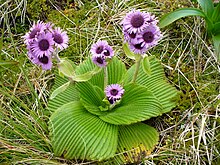Pleurophyllum speciosum, also known as the giant emperor daisy or Campbell Island daisy, is a megaherb native to the Auckland and Campbell Islands of New Zealand.[2] A false colour image is depicted on the lower left corner on the reverse of the current five dollar New Zealand banknote.[3] The Campbell Island daisy was first described by Joseph Dalton Hooker in Flora Antarctica of 1844,[4] after he had collected it during the Ross expedition.
| Pleurophyllum speciosum | |
|---|---|

| |

| |
| Scientific classification | |
| Kingdom: | Plantae |
| Clade: | Tracheophytes |
| Clade: | Angiosperms |
| Clade: | Eudicots |
| Clade: | Asterids |
| Order: | Asterales |
| Family: | Asteraceae |
| Genus: | Pleurophyllum |
| Species: | P. speciosum
|
| Binomial name | |
| Pleurophyllum speciosum | |
Conservation status
editIn both 2009 and 2012 it was deemed to be "At Risk - Naturally Uncommon" under the New Zealand Threat Classification System,[5] and this New Zealand classification was reaffirmed in 2018 (due to its restricted range).[1]
References
edit- ^ a b de Lange, P.J.; Rolfe, J.R.; Barkla, J.W.; Courtney, S.P.; Champion, P.D.; Perrie, L.R.; Beadel, S.M.; Ford, K.A.; Breitwieser, I.; Schönberger, I; Hindmarsh-Walls, R. (1 May 2018). "Conservation status of New Zealand indigenous vascular plants, 2017" (PDF). New Zealand Threat Classification Series. 22: 47. OCLC 1041649797.
- ^ "1. P. speciosum Hook.f. Fl. Antarct. 1, 1844, 31, t. 22, 23". Flora of New Zealand Series. Retrieved 20 July 2008.
- ^ "The history of banknotes in New Zealand". Archived from the original on 17 February 2012. Retrieved 30 December 2011.
- ^ J.D. Hooker (1844). Flora Antarctica, Volume 1, Parts 1-2, Flora Novae-Zelandiae. pp. 3–103.
- ^ "Pleurophyllum speciosum | New Zealand Plant Conservation Network". nzpcn.org.nz. Retrieved 8 February 2020.
